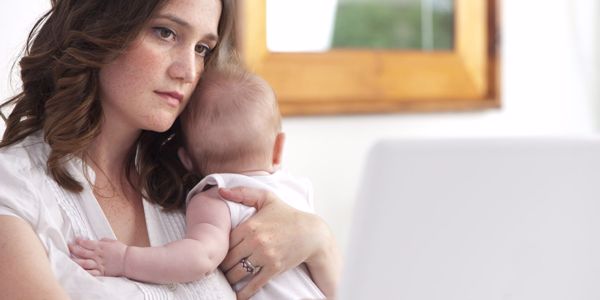Researchers from University College London have found that postnatal depression (PND) doubled amongst new mums during the first COVID-19 lockdown (BPS Research Digest, June 2021).
Normally affecting around a quarter of mothers, it was found that as many as one in two experienced PND during the early days of the pandemic. PND can include a persistent low mood, frightening thoughts about hurting your baby, or losing interest in things you used to enjoy. You can find out more about the symptoms of PND on the NHS website.
PND is more than just the “baby blues”, which can last a couple of weeks. It can have a real impact on mum, dad, and baby but with support and treatment it can get better over time.
Social isolation
Social isolation is common in new parents and can contribute to PND. It’s thought that the social distancing measures introduced during the first lockdown may have contributed to the sharp increase in PND, due to the lack of face-to-face contact with friends and family.
This means that new parents should try and make sure they have a solid support network in place. Anyone who knows a new parent could take the time to check in a bit more regularly than they would normally.
Lockdown mums
If you gave birth during lockdown and have struggled with social distancing, here are a few tips that might help reduce the risk of social isolation and PND:
1. Manage your feelings about missing out
Many mums in the research reported they had been really looking forward to parenthood and all of the exciting firsts that come with it. You may be thinking, “this isn’t how it was supposed to be,” which is a completely valid way to feel at a time like this. Allowing yourself to acknowledge whatever emotions you have about your experience can be a helpful way to process them. Consider setting aside 20 minutes to just write down all of these thoughts and emotions, to get them all out there rather than bottling them up. Then, try to think about all of the nice experiences you have had with your new family over lockdown, even if they weren’t what you expected; and all of the firsts you still have to look forward to.
2. Make new mum friends
Having someone who can truly relate to you and share advice can be so valuable as a first-time mum. The lack of face-to-face contact has made this difficult, so you may not have built up that support network yet. There are lots of mums out there in the same boat though, so try your best - as restrictions allow - to go to groups where you can meet and chat to other mums. You could also take a look at some parent social apps, which are similar to dating apps, but instead help you connect with other parents in your area.
3. Develop your baby’s social skills
Many babies have missed out on bonding with friends, family, and other children in the first few weeks and months of their life. Some mums have found that, as lockdown has eased and they have started to socialise more, their baby has been particularly clingy and needy. This is understandable; your baby isn’t used to lots of other people. But they can quickly learn. Start off small so he or she doesn’t feel overcrowded, with just one or two people visiting your home, where your baby will feel comfortable. Also, consider setting up a playdate with one or two children, rather than going straight to a large hall with lots of little ones running around. Playing is a great way to interact with your baby and get them to engage with other people too - from peekaboo to playing musical instruments.
Expectant mums
With the continuing uncertainty around COVID-19, you may be worrying that we could be back in lockdown when you give birth. Consider speaking to other mums who have been in this position already; online chat rooms can be a good place to ask.
It’s also crucial to build up a social network and have face-to-face meet-ups as much as possible. The researchers at University College London found that the more social contacts new mums saw in person, the less likely they were to report symptoms of PND (BPS Research Digest, June 2021). This means that it may be a useful protective factor to reduce your risk of PND.
Meeting up with friends and family gives them the chance to provide practical help and to check in with you, so they can spot if and when you need help. PND can develop slowly over time, so you may not notice it yourself, so it may be helpful to have someone from the outside who can spot if you’re not quite yourself. Having mum friends is also a really valuable way to get advice, through casual chats over a cup of tea or while your babies are playing.
And finally, try your best to focus on the positives. One mum says: “I think it has been an amazing positive on my partner’s ability to build a bond with the baby and co-parent.” (BPS Research Digest, June 2021). Although it’s hard, there can be some good sides to being home with your family in the early days of parenthood too.
What about new dads?
New dads can often be forgotten about when we discuss PND, but they may be affected by the sleepless nights, changes to routine, and the general pressure of such a huge responsibility as well.
It’s thought that around one in 10 dads will experience PND (NCT, Feb 2018), although that figure could be higher. As we know from other mental health issues, men may be less likely to seek support than women so they tend to go under the radar (Mental Health Foundation, Oct 2021).
Dads can also be affected by their partner’s PND, even if they don’t experience it themselves. Either way, it’s really important to ask for help as soon as possible.
Conclusion
It really does take a village to raise a child, and it can be very difficult if that village is in lockdown! Here are a few final tips to help you survive and thrive as a lockdown parent:
● Socialising is key, ideally, face-to-face where friends and family can see how you’re doing, raise any concerns, and offer advice● Every parent needs help, so actively ask for support when you need it from your partner, friends, family, or healthcare professionals● Check in on your partner regularly, as you may be the first to spot any changes in mood or behaviour that signal PND, if they aren’t seeing colleagues, friends, and family in-person very often
If you do think you or someone you know has PND, seek help as soon as possible from a GP. Remember that it is not your fault and it does not mean you are a bad parent; you deserve to have whatever support you need but this may only happen if you ask for it.







